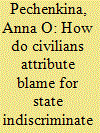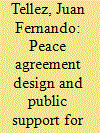| Srl | Item |
| 1 |
ID:
167281


|
|
|
|
|
| Summary/Abstract |
State indiscriminate violence against civilians has been viewed as counterproductive for the government. This conclusion hinges on the assumption that indiscriminate violence aggrieves civilians against the government even when the rebels provoke the state by using civilians as human shields. An alternative view suggests that civilians recognize if the rebels exploit them as human shields and blame the rebels if such provocation occurs. We ask: do civilians evaluate all state indiscriminate violence in the same way or do they think of state indiscriminate violence differently when it is provoked by insurgents? Accounting for the covariate differences between individuals with and without personal experience of warfare in the survey data from postwar Ukraine, we find that personal exposure to violence shapes one’s blame attribution for provoked state attacks on civilians. Individuals unexposed to violence tend to take into account whether the government was provoked by the rebels. By contrast, individuals with personal experience of warfare tend to blame the government for indiscriminate attacks regardless of rebel provocation. This finding has implications for counterinsurgency scholarship and policy. It is likely that the difference between unexposed and exposed to violence civilians emerges in geographically isolated conflicts. If so, targeting of civilians may have different effects on the escalation of insurgency in geographically concentrated as opposed to widespread cases of violence.
|
|
|
|
|
|
|
|
|
|
|
|
|
|
|
|
| 2 |
ID:
169002


|
|
|
|
|
| Summary/Abstract |
Conflict negotiations are often met with backlash in the public sphere. A substantial literature has explored why civilians support or oppose peace agreements in general. Yet, the terms underlying peace agreements are often absent in this literature, even though (a) settlement negotiators must craft agreement provisions covering a host of issues that are complex, multidimensional, and vary across conflicts, and (b) civilian support is likely to vary depending on what peace agreements look like. As a result, we know much less about how settlement design molds overall public response, which settlement provisions are more or less controversial, or what citizens prioritize in conflict termination. In this article, I identify four key types of peace agreement provisions and derive expectations for how they might shape civilian attitudes toward conflict termination. Using novel conjoint experiments fielded during the Colombian peace process, I find evidence that citizens evaluate agreements based primarily on how provisions mete out justice to out-group combatants, and further that transitional justice provisions produced sharp divisions among urban voters in the 2016 referendum. Additional analysis suggests that material, distributive concerns were particularly salient for rural citizens. The results have implications for understanding the challenge of generating public buy-in for conflict termination and sheds light on the polarizing Colombian peace process.
|
|
|
|
|
|
|
|
|
|
|
|
|
|
|
|
| 3 |
ID:
164558


|
|
|
|
|
| Summary/Abstract |
Civilians who have fled violent conflict and settled in neighboring countries are integral to processes of civil war termination. Contingent on their attitudes, they can either back peaceful settlements or support warring groups and continued fighting. Attitudes toward peaceful settlement are expected to be especially obdurate for civilians who have been exposed to violence. In a survey of 1,120 Syrian refugees in Turkey conducted in 2016, we use experiments to examine attitudes towards two critical phases of conflict termination – a ceasefire and a peace agreement. We examine the rigidity/flexibility of refugees’ attitudes to see if subtle changes in how wartime losses are framed or in who endorses a peace process can shift willingness to compromise with the incumbent Assad regime. Our results show, first, that refugees are far more likely to agree to a ceasefire proposed by a civilian as opposed to one proposed by armed actors from either the Syrian government or the opposition. Second, simply describing the refugee community’s wartime experience as suffering rather than sacrifice substantially increases willingness to compromise with the regime to bring about peace. This effect remains strong among those who experienced greater violence. Together, these results show that even among a highly pro-opposition population that has experienced severe violence, willingness to settle and make peace are remarkably flexible and dependent upon these cues.
|
|
|
|
|
|
|
|
|
|
|
|
|
|
|
|